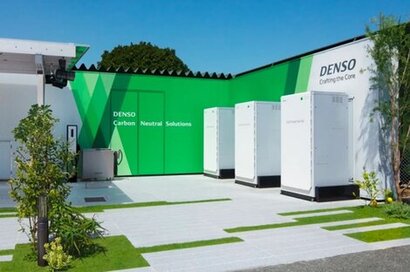
The facility energy management system used in the trial consists of a Solid Oxide Fuel Cell (SOFC) developed by DENSO, as well as a storage battery for transmitting electricity to the plant. It also includes a Vehicle-to-Grid (V2G) system, which enables the use of an electric vehicle as a storage battery to connect to and mutually utilise the power grid of electric utility companies, along with solar panels. This system has been newly installed within Nishio Plant's ‘Pocket Park’.
An SOFC is a device that generates electricity using hydrogen as fuel. Unlike solar power generation, it can generate electricity steadily without being influenced by weather conditions. The SOFC developed by DENSO incorporates thermal management technology and fuel recycling technology, which has been cultivated through automotive components, aiming for the world's highest level power generation efficiency of 65 percent.
At Nishio plant, the equipment is being used to conduct a demonstration with the aim of managing energy more efficiently by charging and discharging batteries and controlling SOFC power generation according to factory power demand. The start of the demonstration will begin with using city gas and aim to flexibly adapt to societal trends by exploring the mixed use of carbon-neutral gases, such as hydrogen, along with natural gas or the exclusive use of carbon-neutral gases. The results of this demonstration will inform carbon-neutral activities at DENSO Fukushima Corporation.
As demonstrations such as this progress, DENSO will offer solutions that can be applied to other manufacturing industries and society, such as industrial equipment at plants and commercial and business facilities, to achieve carbon neutrality of society as a whole. DENSO will continue to take on challenges to develop environmentally-friendly technologies through various demonstrations and help realise carbon neutrality.
For additional information:

